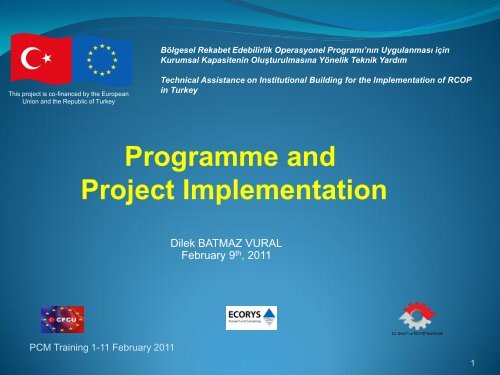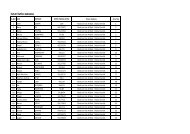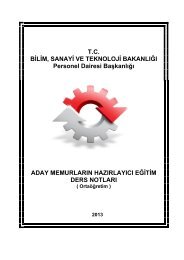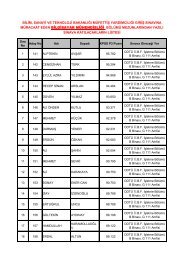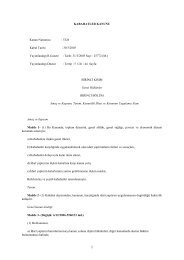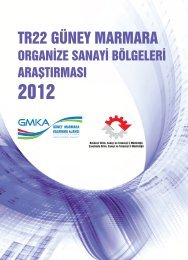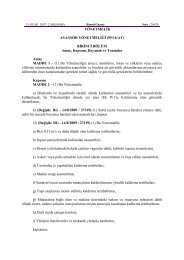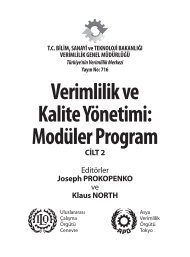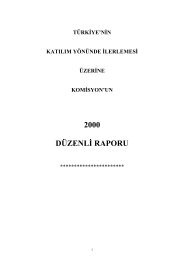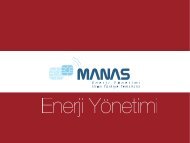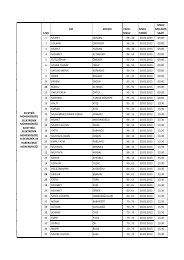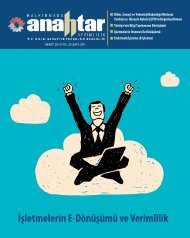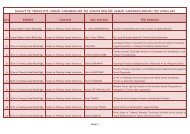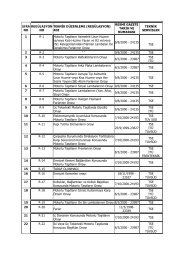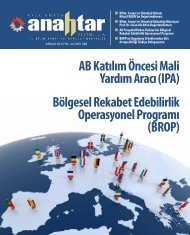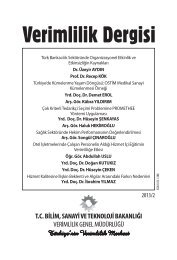Project Management - IPA
Project Management - IPA
Project Management - IPA
Create successful ePaper yourself
Turn your PDF publications into a flip-book with our unique Google optimized e-Paper software.
Bölgesel Rekabet Edebilirlik Operasyonel Programı’nın Uygulanması için<br />
Kurumsal Kapasitenin Oluşturulmasına Yönelik Teknik Yardım<br />
This project is co-financed by the European<br />
Union and the Republic of Turkey<br />
Technical Assistance on Institutional Building for the Implementation of RCOP<br />
in Turkey<br />
Programme and<br />
<strong>Project</strong> Implementation<br />
Dilek BATMAZ VURAL<br />
February 9 th , 2011<br />
PCM Training 1-11 February 2011<br />
1
PCM Training 1-11 February 2011<br />
2
This project is co-financed by the European<br />
Union and the Republic of Turkey<br />
Discussion Topic:<br />
WHY <strong>Project</strong>s Fail?<br />
PCM Training 1-11 February 2011<br />
3
This project is co-financed by the European<br />
Union and the Republic of Turkey<br />
The main reasons for the failure:<br />
Not linked to programme or policy framework<br />
Lack of project coherence and synergy<br />
Lack of relationship between problems and objectives<br />
Poor financial and budget planning<br />
Lack of inter relationship between tasks, financing and time<br />
planning<br />
Lack of engagement of wider stakeholders<br />
PCM Training 1-11 February 2011<br />
4
This project is co-financed by the European<br />
Union and the Republic of Turkey<br />
Unsuccessful <strong>Project</strong>s<br />
Negative impact on the absorption capacity<br />
Undermine the whole programme or sector of intervention<br />
Undermine the credibility of institutions<br />
….but no project turns out totally as<br />
envisaged<br />
PCM Training 1-11 February 2011<br />
5
This project is co-financed by the European<br />
Union and the Republic of Turkey<br />
<strong>Project</strong> <strong>Management</strong> (Beneficiary)<br />
1. Ensure sound preparation of projects<br />
2. Procurement and Contracting of projects<br />
3. Ensure implementation of projects<br />
4. Introduce a good risk management plan<br />
5. Communication with stakeholders and publicity<br />
6. Integrate a monitoring and evaluation system<br />
7. <strong>Project</strong> closures<br />
8. Sustainability<br />
PCM Training 1-11 February 2011<br />
6
Strategic Advisory Committee<br />
ECD, CFCU, OP Center,<br />
Beneficiary, Others<br />
Beneficiary<br />
PIU<br />
Steering Committee<br />
ECD , CFCU, OP<br />
Center, Beneficiary,<br />
others?<br />
Consortium<br />
partners<br />
Subcontractors<br />
Service provider/ main contractor<br />
<strong>Project</strong> team:<br />
Team Leader<br />
Key experts etc.<br />
Payments<br />
and<br />
contract<br />
CFCU<br />
PCM Training 1-11 February 2011<br />
7
This project is co-financed by the European<br />
Union and the Republic of Turkey<br />
<strong>Project</strong> Implementation<br />
• Implementation consists of the following<br />
key contractually obliged activities:<br />
- tendering<br />
- contracting<br />
- payment<br />
- reporting<br />
But the project is not implementing just for the<br />
fulfillment of contractural process…<br />
PCM Training 1-11 February 2011<br />
8
This project is co-financed by the European<br />
Union and the Republic of Turkey<br />
The Phases of the <strong>Project</strong> Cycle<br />
• Programming – Multi-annual Indicative Programme<br />
• Defining/Identification – pre-feasibility study (including<br />
problem analysis), EC decision<br />
• Formulation (Appraisal) – feasibility study, EC decision<br />
• Financing – final EC Financing Agreement<br />
• Implementation – project launch and monitoring<br />
• Evaluation – project assessment<br />
PCM Training 1-11 February 2011<br />
9
This project is co-financed by the European<br />
Union and the Republic of Turkey<br />
1. Ensure sound preparation of<br />
projects<br />
• PCM approach, the project fiche and the log frame help<br />
prepare the project for approval<br />
• <strong>Project</strong> preparation is key to success in applications for EU<br />
funding<br />
• Key documentation (e.g. project fiche, log frame and TOR)<br />
and approach must be followed<br />
• <strong>Project</strong> proposal is also the framework for implementation<br />
PCM Training 1-11 February 2011<br />
10
This project is co-financed by the European<br />
Union and the Republic of Turkey<br />
PROJECT PREPARATION<br />
<strong>Project</strong> cycle phases - structured & informed decision-making, and<br />
feedback from evaluation<br />
Partner / stakeholder ownership - involvement of stakeholders in<br />
decision-making, including emphasis on teamwork and communication<br />
Logframe planning - comprehensive & consistent analysis<br />
Integrated documentation - standardised documentation and<br />
assessment criteria<br />
PCM Training 1-11 February 2011<br />
11
This project is co-financed by the European<br />
Union and the Republic of Turkey<br />
2. Procurement and Contracting of <strong>Project</strong>s<br />
• Once the objectives are clearly specified then a<br />
decision needs to be taken on which instrument(s)<br />
are the most cost effective for achieving these<br />
objectives:<br />
- Service<br />
- Supply<br />
- Works<br />
- GRANT<br />
PCM Training 1-11 February 2011<br />
12
This project is co-financed by the European<br />
Union and the Republic of Turkey<br />
When to use a grant scheme?<br />
• When we need to generate quickly visible<br />
results<br />
• To increase capacity of local organisations<br />
• To stimulate partnership working<br />
PCM Training 1-11 February 2011<br />
13
This project is co-financed by the European<br />
Union and the Republic of Turkey<br />
GRANT SCHEME<br />
PROJECT 1.3<br />
COMP 1.3.1 COMP 1.3.2 COMP 1.3.3 COMP 1.3.4<br />
GP 1 GP 2 GP 3 GP 4<br />
GP X<br />
PCM Training 1-11 February 2011<br />
14
This project is co-financed by the European<br />
Union and the Republic of Turkey<br />
Grant Scheme/PRAG Requirements<br />
Phase PRAG Requirements Optional Activities<br />
Call for Proposals on the EC and CFCU<br />
web pages<br />
Launch –<br />
Submission<br />
Guidelines and Annexes on the EC and<br />
CFCU web pages<br />
Promotional leaflets<br />
Posters<br />
Information Seminars<br />
Press conferences<br />
<strong>Project</strong> web-site<br />
Receipt to<br />
Contracting<br />
Implementation<br />
Contract Award Notice on the EC and<br />
CFCU web pages<br />
Web-site<br />
Final conference<br />
PCM Training 1-11 February 2011<br />
15
This project is co-financed by the European<br />
Union and the Republic of Turkey<br />
Grant Scheme/ Drafting of Contracts<br />
• Grant Contract: signed between the Contracting Authority and<br />
the Beneficiary<br />
• Contract is annexed to the Guidelines for Applicants<br />
• Contract should also be in line with legal provisions of Labour<br />
Code, Occupational Safety and Health Legislation, Tax and<br />
Accountancy Laws and any other relevant legislation in<br />
beneficiary country<br />
PCM Training 1-11 February 2011<br />
16
This project is co-financed by the European<br />
Union and the Republic of Turkey<br />
1. Site visits<br />
• Spot Checks<br />
• Problem<br />
• Important Activity<br />
• Suspicion<br />
<strong>Management</strong> and Monitoring<br />
(Monitoring Team)<br />
2. Reports<br />
• Technical<br />
• Financial (during disbursements)<br />
3. MIS<br />
• Data storage facility<br />
• Contract management<br />
• Reporting<br />
PCM Training 1-11 February 2011<br />
17
This project is co-financed by the European<br />
Union and the Republic of Turkey<br />
3. Ensure implementation of projects<br />
Human Resources<br />
<strong>Project</strong> implementation Unit<br />
• <strong>Project</strong> Manager with management experience in the<br />
relevant field<br />
• Content or technical experts (design, feasibility etc)<br />
• Financial expert<br />
• Legal expert (procurement, contracting)<br />
• Administrative support<br />
• Monitoring and evaluation expert<br />
PCM Training 1-11 February 2011<br />
18
This project is co-financed by the European<br />
Union and the Republic of Turkey<br />
The Role of the <strong>Project</strong> Manager:<br />
• To take action before problems exist<br />
• To have the authority necessary to manage the project and get the<br />
tasks done<br />
• To deal with scope, quality, schedule, risk and other key subjects in the<br />
project<br />
• To be the one person that will combine the project components into a<br />
consistent, organized and solid whole that will satisfy customer needs<br />
PCM Training 1-11 February 2011<br />
19
This project is co-financed by the European<br />
Union and the Republic of Turkey<br />
A <strong>Project</strong> Manager has a good blend of:<br />
- Leadership<br />
- <strong>Management</strong><br />
- Knowledge of organizational politics<br />
- AND an area of technical expertise<br />
PCM Training 1-11 February 2011<br />
20
This project is co-financed by the European<br />
Union and the Republic of Turkey<br />
Quality<br />
Budget<br />
Time<br />
•Good project management ensures projects to<br />
stay within the given constraints (boundaries)<br />
and these factors are interrelated<br />
- Higher quality means higher costs<br />
- More time (delays) results in higher costs<br />
PCM Training 1-11 February 2011<br />
21
This project is co-financed by the European<br />
Union and the Republic of Turkey<br />
4. <strong>Project</strong> Risk <strong>Management</strong><br />
Process of identifying, analyzing, and<br />
responding to project risk<br />
PCM Training 1-11 February 2011<br />
22
This project is co-financed by the European<br />
Union and the Republic of Turkey<br />
Risks Programme <strong>Management</strong><br />
Categories of risks<br />
Internal External<br />
Organisational<br />
Political/adminstrative<br />
Spatial<br />
Financial/economic<br />
Technical<br />
Social<br />
Law<br />
PCM Training 1-11 February 2011<br />
23
Risk Assessment<br />
Rating Probability Impact<br />
1 Almost none existent Insignificant<br />
2 Below average Below medium<br />
impact<br />
3 Average: 50% Medium<br />
4 Above average Above medium<br />
5 Certain or very likely A disaster!!<br />
PCM Training 1-11 February 2011<br />
24
This project is co-financed by the European<br />
Union and the Republic of Turkey<br />
Risk<br />
• A possibility of an undesired outcome, or the absence of a<br />
desired outcome.<br />
• Manager must accept the fact that risks will always be<br />
present.<br />
Risk <strong>Management</strong><br />
• The activity of identifying and controlling risk factors<br />
proactively.<br />
• In order to manage risks we need to deal with uncertainties.<br />
PCM Training 1-11 February 2011<br />
25
This project is co-financed by the European<br />
Union and the Republic of Turkey<br />
Risk <strong>Management</strong><br />
• Quality assurance of preparatory studies; mistakes in<br />
project preparation result in problems in<br />
implementation<br />
• Good feasibility studies for projects<br />
• Ensure proper selection of contractors (procedures)<br />
• Sound contracts with contractors (with clear<br />
conditions for delays and cost overruns)<br />
• Sound and clear project supervision<br />
PCM Training 1-11 February 2011<br />
26
This project is co-financed by the European<br />
Union and the Republic of Turkey<br />
• Risk <strong>Management</strong> Plan<br />
1. Identify Risks<br />
2. Categorise Risks<br />
3. Analyze Risks<br />
4. Prioritise Risks<br />
5. Resolve Risks<br />
6. Monitor Risks<br />
PCM Training 1-11 February 2011<br />
27
This project is co-financed by the European<br />
Union and the Republic of Turkey<br />
1. Identify Risk<br />
A risk is the possibility in which an undesired outcome or the absence of a<br />
desired outcome disrupts a project.<br />
Risk identification and management will be an ongoing activity involving the<br />
<strong>Project</strong> Teams as well.<br />
2. Categorise Risks<br />
Risk severity depends on the project and its included activities.<br />
To classify and prioritize the severity of risks, a company should use the scale of<br />
“high,” “medium,” or ”low”. The same scale can be used for risk probability.<br />
PCM Training 1-11 February 2011<br />
28
This project is co-financed by the European<br />
Union and the Republic of Turkey<br />
3. Analyze Risk<br />
• Identify risk event driver<br />
• Estimate risk event probability<br />
• Identify impact driver and total loss<br />
• Estimate impact probability<br />
PCM Training 1-11 February 2011<br />
29
This project is co-financed by the European<br />
Union and the Republic of Turkey<br />
4. Prioritize Risks<br />
• Calculate an expected loss value for each risk<br />
• Rank risks in descending order<br />
PCM Training 1-11 February 2011<br />
30
This project is co-financed by the European<br />
Union and the Republic of Turkey<br />
5. Resolve Risk<br />
• Develop risk action plans to reduce the probability<br />
of risk event, and the likelihood of risk occurrence<br />
and magnitude of the total loss.<br />
PCM Training 1-11 February 2011<br />
31
This project is co-financed by the European<br />
Union and the Republic of Turkey<br />
Risks: Programme Level<br />
• Poor program or project design (irrelevancy of measures)<br />
• Non-eligible projects<br />
• Commitment of stakeholders (including politicians)<br />
• Program available on time<br />
• Administrative capacity/improper program or measure management<br />
• Monitoring problems: lack of information, skills<br />
• Lack of project pipeline: not enough projects/low quality of projects<br />
• Delays due to procurement procedures, land issues, technical, etc.<br />
• Absorption capacity/co-financing problems<br />
• Cost overruns<br />
• Irregularities or fraud<br />
PCM Training 1-11 February 2011<br />
32
This project is co-financed by the European<br />
Union and the Republic of Turkey<br />
Risk <strong>Management</strong> Actions for<br />
Programme <strong>Management</strong><br />
Programming Phase:<br />
• Ex-ante evaluation of programme and improvement to<br />
ensure quality<br />
• Administrative capacity assessment to detect<br />
bottlenecks and take actions<br />
• Estabishing partnership in Programming phase/ ensure<br />
commitment of all stakeholders<br />
• Sound <strong>Management</strong> Information System<br />
• Prepare Risk <strong>Management</strong> Plan for implementation<br />
PCM Training 1-11 February 2011<br />
33
This project is co-financed by the European<br />
Union and the Republic of Turkey<br />
Risk <strong>Management</strong> Actions:<br />
During Implementation:<br />
• Support, TA and capacity building for beneficiaries<br />
• <strong>Project</strong> pipeline support: assess quality of project applications,<br />
support in improvement and ensure partnership<br />
• Feasibility studies for projects<br />
• Check eligibility of priority axis/projects<br />
• Monitoring procedures and take actions on outcomes of<br />
monitoring<br />
• Set trigger points in priority axis<br />
PCM Training 1-11 February 2011<br />
34
This project is co-financed by the European<br />
Union and the Republic of Turkey<br />
Group Exercise 1<br />
Establish teams of 4-6 persons and consider you are<br />
managing a programme, priority or project relevant for<br />
your OP.<br />
What are the most important risks for the OP or your<br />
priority or project<br />
Pleae use the risk assessment table and the risk<br />
management plan<br />
PCM Training 1-11 February 2011<br />
35
This project is co-financed by the European<br />
Union and the Republic of Turkey<br />
6. Communication<br />
Getting the right information to the right people at the right<br />
time and in a useful format is just as important as<br />
developing the information in the first place<br />
Important considerations include<br />
- using technology to enhance information distribution<br />
- formal and informal methods for distributing information<br />
PCM Training 1-11 February 2011<br />
36
This project is co-financed by the European<br />
Union and the Republic of Turkey<br />
Communication Plan<br />
Know your stakeholders: groups of people who can influence project<br />
success and are affected by the project<br />
Create a communications plan<br />
Define stakeholders<br />
Develop communication plan<br />
Identify<br />
talents for communication<br />
means of communication<br />
frequency of communication<br />
PCM Training 1-11 February 2011<br />
37
This project is co-financed by the European<br />
Union and the Republic of Turkey<br />
Communication Tools:<br />
<strong>Project</strong> Schedules<br />
Conventions<br />
Briefings<br />
Conversations<br />
Reviews<br />
Reports<br />
Video<br />
CD<br />
Email<br />
Written<br />
Meetings<br />
Web based<br />
PCM Training 1-11 February 2011<br />
38
This project is co-financed by the European<br />
Union and the Republic of Turkey<br />
7. Integrate a monitoring and evaluation<br />
system<br />
Monitoring: Ongoing analysis of project progress towards<br />
achieving results with the purpose of improving<br />
management decision making.<br />
Evaluation: Assessment of the efficiency, effectiveness,<br />
impact, relevance and sustainability of aid policies and<br />
actions.<br />
PCM Training 1-11 February 2011<br />
39
This project is co-financed by the European<br />
Union and the Republic of Turkey<br />
Who?<br />
When? Ongoing<br />
Why?<br />
Focus<br />
on<br />
Monitoring & Regular<br />
Review<br />
Internal management<br />
responsibility – all levels<br />
Check progress, take<br />
remedial action, update<br />
plans<br />
Inputs, activities,<br />
results<br />
Evaluation<br />
Usually incorporates<br />
external inputs<br />
(objectivity)<br />
Periodic – mid-term,<br />
completion, ex-post<br />
Learn broad lessons<br />
applicable to other<br />
programmes / projects,<br />
policy review, etc.<br />
Results, purpose, objective<br />
PCM Training 1-11 February 2011<br />
40
This project is co-financed by the European<br />
Union and the Republic of Turkey<br />
8. <strong>Project</strong> finalisation and the closure<br />
• Provide guidance on final report and audit<br />
• Check expenditures and advices<br />
• Monitoring/Steering Committee on final<br />
settlement<br />
• Sent beneficiary final decision on project<br />
and procedure for appeal<br />
• Final payment<br />
PCM Training 1-11 February 2011<br />
41
This project is co-financed by the European<br />
Union and the Republic of Turkey<br />
9. Sustainability<br />
The “continuation of benefits after project completion”<br />
The EU recognises three types of sustainability:<br />
• Financial sustainability - how will activities be financed<br />
after the project?<br />
• Institutional sustainability - who will „own‟ the project<br />
after its completion?<br />
• Policy level - will the project improve policy, legislation,<br />
codes of conduct, standards etc.<br />
PCM Training 1-11 February 2011<br />
42
This project is co-financed by the European<br />
Union and the Republic of Turkey<br />
Sustainability 2<br />
When assessing sustainability, consider:<br />
• What is the impact on the target group/end<br />
beneficiaries?<br />
• How will the target groups use<br />
skills/knowledge/information/facilities in the future?<br />
• Is your project a catalyst for change?<br />
• Is your project a model for adoption elsewhere?<br />
• Does your project aim to disseminate this model to<br />
others?<br />
PCM Training 1-11 February 2011<br />
43
This project is co-financed by the European<br />
Union and the Republic of Turkey<br />
A Strategy for Sustainability<br />
Refer back to the expected changes for each of<br />
your results:<br />
• A changed situation<br />
• A changed condition<br />
• A changed level of knowledge<br />
• A change in an attitude<br />
• A change in behaviour<br />
How will this change be sustained?<br />
Among individuals?<br />
Within institutions?<br />
Within a region?<br />
PCM Training 1-11 February 2011<br />
44
This project is co-financed by the European<br />
Union and the Republic of Turkey<br />
Group Exercise 2<br />
• Using the OIS at hand;<br />
• Please develop a sustainability plan<br />
PCM Training 1-11 February 2011<br />
45
This project is co-financed by the European<br />
Union and the Republic of Turkey<br />
Supporting Tools:<br />
formats, guidelines and checklists<br />
• Make your life easier; develop formats and<br />
guidelines that suit your needs!<br />
• Up to the MA what forms and guidelines will be<br />
developed; no EU standards except for information<br />
to be send to the EC<br />
• Part of rules of procedure<br />
PCM Training 1-11 February 2011<br />
46
This project is co-financed by the European<br />
Union and the Republic of Turkey<br />
Formats<br />
Why?<br />
• It structures the information you need:<br />
- You get the right information<br />
- You get the complete information<br />
- You know where to find the information<br />
• It structures the procedures<br />
PCM Training 1-11 February 2011<br />
47
This project is co-financed by the European<br />
Union and the Republic of Turkey<br />
Formats for what?<br />
• You need forms for all stages of the programma and<br />
project cycle<br />
• Application procedure (call, appraisal reports)<br />
• Forms contracting (contract, implementation agreement)<br />
• Forms implementation (reports, Risk <strong>Management</strong> Plan,<br />
standard letters)<br />
• Forms closure: (report, audit report, decision on<br />
financial contribution)<br />
PCM Training 1-11 February 2011<br />
48
This project is co-financed by the European<br />
Union and the Republic of Turkey<br />
Formats provided by the EC<br />
• Annexes reg 1828/2006:<br />
- Annual and final reports<br />
- Audit strategy<br />
- Annual control report<br />
- Final control report OP<br />
- Etc.<br />
- Also formats for reporting on NSRF level<br />
- > EC requires lot of information and produced<br />
many formats<br />
PCM Training 1-11 February 2011<br />
49
This project is co-financed by the European<br />
Union and the Republic of Turkey<br />
Guidelines<br />
• Guidelines will help beneficiaries to apply for<br />
and implement the projects according to the<br />
rules and procedures.<br />
• Helps preventing major mistakes, and thus,<br />
the absorption of the funds<br />
- Application procedure<br />
- Guidelines on communication (requirements,<br />
formats)<br />
- Guidelines on project adminstration<br />
- Guidelines public procurement<br />
- …<br />
PCM Training 1-11 February 2011<br />
50
This project is co-financed by the European<br />
Union and the Republic of Turkey<br />
Checklists<br />
Checklists can be used to assess completeness,<br />
administrative compliance and technical quality of<br />
documents and reports<br />
Examples:<br />
• Checklist eligibility<br />
• Checklist project application form<br />
• Checklist assessing feasibility study<br />
PCM Training 1-11 February 2011<br />
51
This project is co-financed by the European<br />
Union and the Republic of Turkey<br />
THANK YOU FOR YOUR PARTIC<strong>IPA</strong>TION...<br />
PCM Training 1-11 February 2011<br />
52


